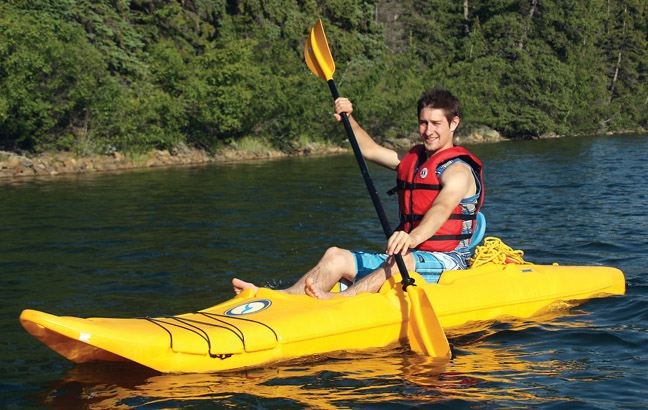On April 9, 2015, when Jared Parker made the last choice he'd ever make, he didn't leave a note. It's typical in cases of suicide, said Linda Parker, seven months after she lost her 20-year-old son.
"The family is left with more questions than answers. Always. And in most cases there is nothing left," Parker said.
"There is no nice neat explanation. It doesn't work that way.
"It's a desperate act."
Since September, Parker has been raising funds to offer a scholarship at the University of Northern B.C. in his memory.
"We thought it would be a wonderful opportunity to give something positive to the community through our tragedy," said Parker, who has been helped by friends Andrea and Lawrence Fredeen. "I'm determined to raise the required funds."
Parker has raised $7,500 - still a way off of the $30,000 needed to offer an annual $1,000 Jared Parker Memorial Scholarship targeted to students studying suicide and depression.
"As a mother I feel I've failed my son," said Parker, her eyes glassy. "There are tremendous feelings of guilt and I just want to save other families the profound grief."
While Parker wants better research for mental health, she also blames the stigma that shuts out conversations around these issues.
"It's so important for the community to become aware that this is not an isolated incident," said Parker, adding she knows of four families with children who died by suicide.
According to the Canadian Mental Health Association, suicide accounts for 24 per cent of all deaths among 15 to 24 year olds, and is the second leading cause of death for that age group.
"We were a perfectly normal, healthy family and we're completely devastated," said Parker, who is the RCMP's community policing coordinator.
"The trouble is we don't talk about it. It's acceptable for us to talk about cancer and diabetes but it's not acceptable nor do people speak openly about their depression or their anxiety."
That was the case with Jared.
"He wasn't particularly honest, he wasn't particularly truthful about what he was going through, perhaps through shame, perhaps through guilt.
"We thought he was coping."
Community health student Valerie Ward said the scholarship would be unique. Nothing yet exists that focuses students toward mental health research in a northern context.
"There's just differences in the north and the small communities, and access to resources and different demographics," said Ward, a second year UNBC grad student.
"That's really important to be reflected within the resources and by learning more about that and doing research in that area, we may be able to offer better resources, or meet the needs more effectively or efficiently."
Jared was never properly diagnosed, Parker said.
At maybe 10 or 11 years old, Jared got a concussion playing minor hockey.
A year later, he suffered another concussion from snowboarding. Both times he was wearing the proper protective equipment, but when Parker reads into research around brain injuries, she's left with more questions.
"As a parent I'm now left wondering did that shape his future because as he moved into his teens, we found his personality changed."
Once active and popular, Jared became increasingly withdrawn. The Parkers thought they were dealing with a typical difficult teen, but it soon became more than that.
By the time he attended College Heights secondary school, Jared was withdrawn, and Parker said it was a downward spiral from there.
"It was a miserable time for Jared. He was no longer the popular kid. He had dropped virtually all athletics at that point, was bullied.
"I think to deal with his ensuing depression, he tried to self medicate, as many individuals do when they're suffering from depression or anxiety."
He was given some medication for anxiety and had some counselling at school and after graduation. For a time it seemed like there was improvement, but in April Jared joined what Parker called the "disturbing" suicide statistic that afflicts youth, and particularly men.
The scholarship is one way for Parker to address those numbers and affect change.
"This is part of our healing," she said.
Donations can go directly through UNBC or online at www.unbc.ca/giving, but donors must specify Jared Parker Memorial Scholarship Fund as the recipient.


